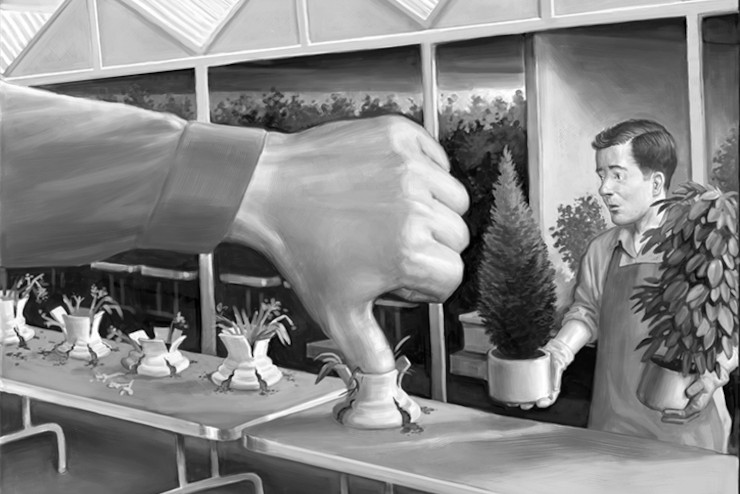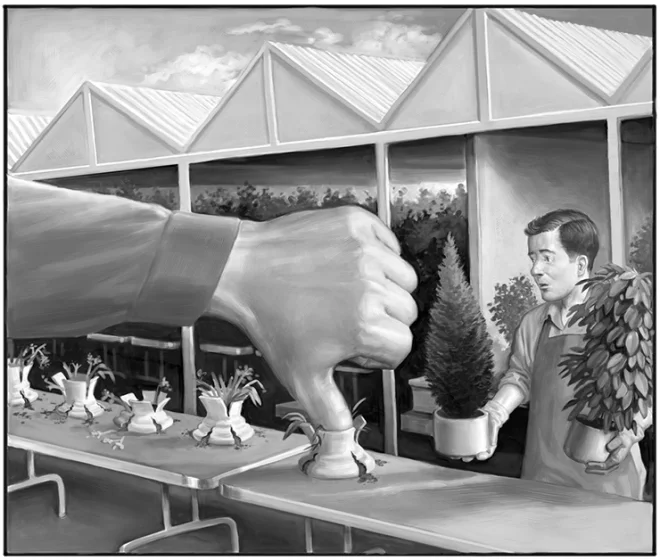
If you’ve had the pleasure of working a customer service job of any kind, you’ll be able to relate to the nursery man in this story. Of course, most customers are polite and appreciative. Some of them even bring you treats on holidays! And there are some people who just aren’t happy with anything. Whoever coined the phrase, “The customer is always right,” surely never worked in a restaurant or retail shop. A friend once told me about a restaurant patron he waited on that sent water back because it wasn’t organic. Yes, you read that correctly.
If you think that sounds ridiculous, wait until you meet the customer in Larry E. Larl’s story, The Nurseryman’s Lament! Things began simply enough when a customer came into Larry’s shop looking for a shrub. That was the end of simple, though.
This customer was looking for the impossible plant. He wanted something deer-resistant and with “lots of flowers”. But things really got interesting when the customer declared he didn’t “want any darned pruning and fertilizing and watering.” Oh … and evergreen, not too tall, and cheap.
Seems like a tall order! Did our nursery man help this customer find what he was looking for? Was it even possible? It turns out that there is one and only one plant that would meet this customer’s needs. Read Larry’s story to find out what it was.
From the Nursery Man to the Hapless Gardener, You’ll Find All Kinds of Gardening Humor in GreenPrints.
This story comes from our archive that spans over 30 years and includes more than 130 magazine issues of GreenPrints. I love pieces like these that turn stories into comical moments of laughter, and I hope you enjoy this story as well.

The Nurseryman’s Lament
The customer is always right? Riiiiight!
By Larry E. Larl
Oh, don’t get me wrong. I am grateful for every customer who comes into our nursery here in Rochester, Washington, whether they are there to browse, tour our display garden, or buy plants. Many are like kids in Disneyland, laughing and oohing and ahhing nonstop.
But once in a while we get…the other kind.
Such a customer came in one day last spring, just as I opened the gate for the day. “Hello,” I said in my best customer-service voice. “Can I help you find anything, or would you like to just look around?”
“You can help me,” he said. “I’m looking for a shrub to plant by my deck.”
“How tall do you want it to get?” I asked. “Oh, not too tall,” he said, with somewhat less than precision.
I smiled. “How tall is too tall?” I said, hoping for a clue.
“Oh, just medium height,” he clarified—but not much.
Without saying so, I pegged medium height as four feet and pressed on.
“Is the site sunny or shady?” I asked.
He gave me a mildly perturbed look and first said he didn’t know, then that it got some sun.
“Is it in all-day sun? I asked, hoping to suggest an appropriate plant or two after I knew the conditions.
“Yes, it gets some sun,” he said, leaving me no wiser than before.

“How about a dwarf conifer?” I said. “We have several varieties that stay under four feet.”
“What kind of flowers do they have?” he wanted to know.
“Well, they don’t really have flowers, but some have beautiful cones and variegated needles,” I said.
“No, I want lots of flowers, and I don’t like needles,” he replied. So much for conifers.
“How about a rose? We have some nice disease-resistant ones that bloom a lot. They come in a variety of colors. The only problem we know of is that deer eat them. Do you have deer?”
“We are crawling with the buggers. They’re everywhere,” he growled, as if to say why didn’t you know that? So much for roses.
He was a challenge, but I’m no quitter, and I’d only scratched the surface of the thousand-plus varieties of plants we sell. “There are some sun-tolerant deciduous azaleas that have flowers in the spring,” I suggested, “and they can be kept under four feet by pruning at the right time. They are easy to grow here with regular water and fertilizer.”
His expression told me that he didn’t like hearing this last bit. “Don’t want any darned pruning and fertilizing and watering,” he grumped. “Besides, I want something evergreen. Don’t you have any better ideas?”
My mind raced through the huge variety of plants we stock, searching for one that would meet his needs. Clearly, he would not be a candidate for any of the esoteric plants we sell. I looked around the display garden hoping for an inspiration. “Maybe you could try a native plant,” I suggested. “Maybe Oregon grape. They are evergreen, they have flowers in the spring, deer don’t eat them, they don’t get too big, and they’re drought-tolerant here once they’re established.”
“That might work,” he said skeptically. “How much do they run?”
At this point I was losing my patience, but I fought the urge to say that they don’t run at all—they just sit there in their pots absorbing carbon dioxide and emitting oxygen.
“They are nice plants in two-gallon pots,” I said nicely, “and they’re $10.99.”
“$11.00?!” He bellowed. “That’s ridiculous! You should be ashamed of yourself, charging that much for a plant that grows wild around here!”
By now there were other people waiting for help, and all the other workers were already busy. Plus, I admit, I was beginning to get a little hot under the collar.
I looked at the unhappy customer. “I have to go,” I said. “Perhaps if you browse around some, you’ll find what you need.”
This, of course, was a polite way of saying Get lost. But at least it wasn’t what I really wanted to say:
“There is one other evergreen plant that blooms a lot, doesn’t have to be watered, pruned, or fertilized, and isn’t eaten by deer. Unfortunately, we don’t stock it, but you can find it in a craft store. The botanical name is Plastica Vulgaris.” ❖
By Larry E. Larl, published originally in 2016, in GreenPrints Issue #105. Illustrated by Matt Collins

Have you ever worked in a customer service job? Do you have a “favorite” customer story to share?



